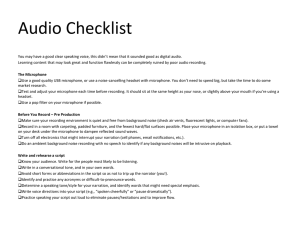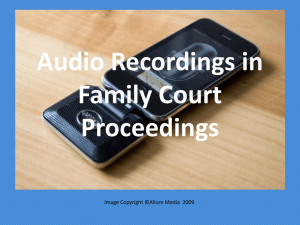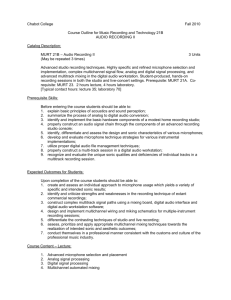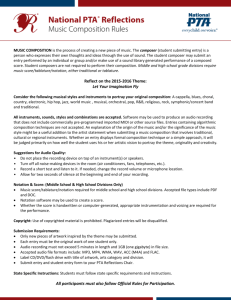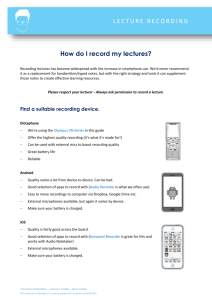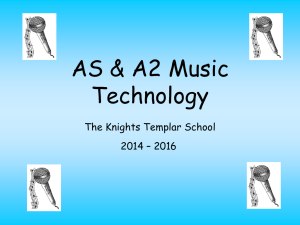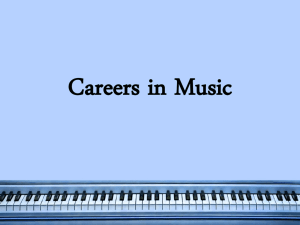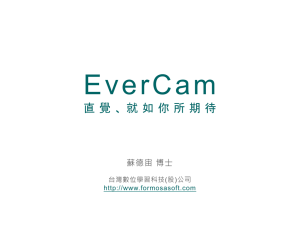MUS 2208 Basics in Audio Music Recording
advertisement
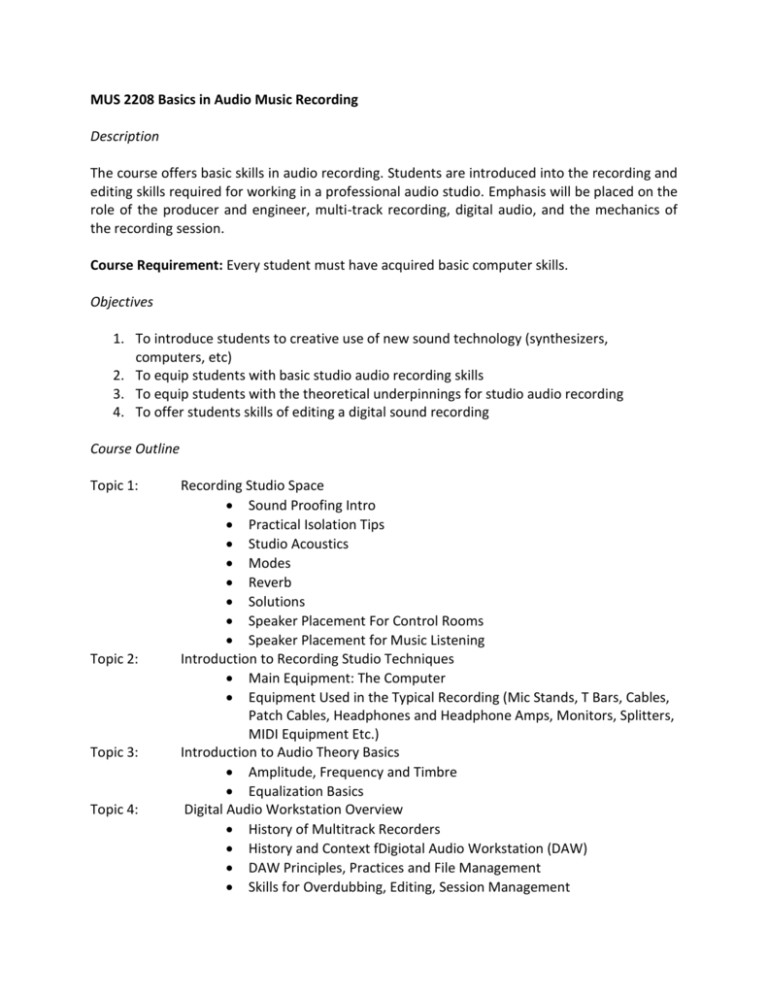
MUS 2208 Basics in Audio Music Recording Description The course offers basic skills in audio recording. Students are introduced into the recording and editing skills required for working in a professional audio studio. Emphasis will be placed on the role of the producer and engineer, multi-track recording, digital audio, and the mechanics of the recording session. Course Requirement: Every student must have acquired basic computer skills. Objectives 1. To introduce students to creative use of new sound technology (synthesizers, computers, etc) 2. To equip students with basic studio audio recording skills 3. To equip students with the theoretical underpinnings for studio audio recording 4. To offer students skills of editing a digital sound recording Course Outline Topic 1: Topic 2: Topic 3: Topic 4: Recording Studio Space Sound Proofing Intro Practical Isolation Tips Studio Acoustics Modes Reverb Solutions Speaker Placement For Control Rooms Speaker Placement for Music Listening Introduction to Recording Studio Techniques Main Equipment: The Computer Equipment Used in the Typical Recording (Mic Stands, T Bars, Cables, Patch Cables, Headphones and Headphone Amps, Monitors, Splitters, MIDI Equipment Etc.) Introduction to Audio Theory Basics Amplitude, Frequency and Timbre Equalization Basics Digital Audio Workstation Overview History of Multitrack Recorders History and Context fDigiotal Audio Workstation (DAW) DAW Principles, Practices and File Management Skills for Overdubbing, Editing, Session Management Topic 5: Topic 6: Topic 7: Topic 8: Topic 9: Topic 10: Experiential Exercises with DAW. Introduction to Microphones Basic Microphone Theory: Condenser, Dynamic, Polar Patters, Phantom Power, Frequency Response, Sensitivity Introduction to Microphone Selection and Placement Recording Experience with Microphone Positioning Microphone Techniques Discussion (i.e. XY, Spaced Pair, Glyn Johns, Decca Tree etc.) MS Microphone Technique Recording Drums Introduction to the Equipment Signal Path Basic Console Routing Drum tuning Mics Microphone Placements Phase EQ/Compression Drum Tracking Drum Editing Bass and Guitars Amp Selection and Setup Mixing Techniques Phase EQ/Compression Tracking Editing Recording Vocals Mixing Techniques EQ/Compression Vocal Stacking Doubling Vocal Editing Tuning Editing and Mixing Preparing the Tracks EQ Compression Effects Balancing Mono Compatibility Stereo Buss EQ/ Compression Mastering An Introduction Dynamics Processing and Effects Processing Recap of Routing Methods and Principles: Inserts and Auxiliaries Topic 11: Introduction to Dynamics Processing Introduction to Effects Processing Usage of Dynamics Processing in Recording Usage of Effects Processing in Recording Recording Session Introduction to the Recording Session: Getting Started, Managing the Process Getting to Know the Musicians, Introductions, Client Management Learning Outcomes 1. Ability to use contemporary methods of music composition, arranging, recording and production using current hardware and computer applications with particular emphasis on Sibelius and Pro Tools LE software. 2. Competence is creative use of new sound technology (synthesizers, computers, etc) Methods of Teaching/Delivery Lectures, demonstrations, hands-on, lab, tutorials, Individual readings, field trips Modes of Assessment Course Work: Attendance and Participation in Class Discussion: 5% Lab Assignments: 25% Mid-Semester Test: 10% Final Examination Project: 30% Written: 30% Selected Readings Hosken, Dan. 2010. An Introduction to Music Technology. New York and London: Routlegde. Paul III, Bobby Owsinski. 2009. The Studio Musician’s Handbook: Music Pro Guides.Maliwaukee, WI: Hal Leonard Corporation. Penfold, R. A. 1992. Computers and Music; An Introduction. 2nd Edition.New York. Cimino Publishing Group. Rumsey, Francis and Tim McCormick. 2008. Sound and Recording, Fifth Edition: An Introduction (Music Technology). Oxford, UK: Elsevier. Williams, David Brian. 2006. Experiencing Music Technology (with DVD-ROM).Third Edition. New York: Schirmer. Utzh, Peter. 2003. Introduction to Audio (Computer Music and Digital Audio Series). New York: A-R Editions.

